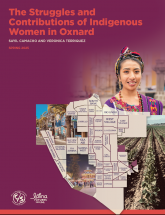The Struggles and Contributions of Indigenous Women in Oxnard
CSRC Research on California's Youth and Young Adults
May 2025
Oxnard, a coastal city in California, is known for its thriving agricultural industry and vibrant immigrant community, which together form the backbone of its local economy. Like many cities that attract immigrants, Oxnard has been shaped by global economic forces that draw people seeking employment and hoping to build a better life. Today, Latina/o immigrants and their children make up the vast majority of the city’s population.
While the Latina/o community is highly visible in Oxnard, the city is also home to a large population of Indigenous immigrants from Mexico and, to a lesser extent, Central America. Since the 1970s, Indigenous people have played a critical role in shaping the city’s labor force, especially in agriculture and other essential industries (Rivera Salgado 2015). However, despite their deep roots and numerous contributions, many Indigenous immigrants continue to face significant economic and social challenges.
For Indigenous women in particular, these challenges are often compounded. Many work in low-wage jobs where they may be vulnerable to exploitation, including sexual harassment, and are also burdened by unpaid domestic responsibilities. These barriers make it harder for them to achieve financial stability and upward mobility. Still, Indigenous women are often leaders in their communities, drawing on strong traditions of mutual support, cultural preservation, and collective care. These values spur civic engagement and strengthen Oxnard’s social fabric.
This report draws on findings from the Oxnard Thriving Youth Study (TYS), led by the UCLA Chicano Studies Research Center, to shed light on the experiences of Indigenous women in comparison to those of their non-Indigenous Latina peers. Our analysis is based on responses from 1,675 participants living in Oxnard, including 1,392 non-Indigenous Latinas and 283 Indigenous respondents. Findings indicate that Indigenous women disproportionately face economic, health, educational, and discriminatory challenges. They nonetheless remain deeply engaged in their communities and foster local social and civic connections. As such, our study underscores the important role of Indigenous women in civic life in Oxnard.
Published by the UCLA Chicano Studies Research Center and the Latina Futures 2050 Lab.

